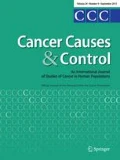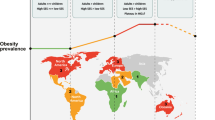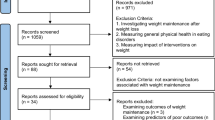Abstract
Objective
We examined the association between body mass index (BMI) around the time of diagnosis, weight change post-diagnosis, and breast cancer prognosis in a prospective cohort study of 1,692 breast cancer survivors.
Methods
Pre-diagnosis weight, weight at study entry, and height was obtained from mailed questionnaires and then weight change and BMI were calculated. After approximately seven years of follow-up, 207 recurrences, 99 deaths due to breast cancer, and 162 deaths due to any cause were reported. Delayed entry Cox proportional hazard models were used to estimate hazard ratios (HR) and 95% confidence intervals (CI), controlling for treatment and known prognostic factors.
Results
Being obese one year before diagnosis was associated with an increased risk of death from any cause (HR = 1.6; 95% CI: 1.1–2.3) and a suggestion of increased risk of death from breast cancer (HR = 1.6; 95% CI: 0.9–2.7). However, weight gain up to four years after a breast cancer diagnosis was not associated with an increased risk of recurrence or death from any cause nor did moderate weight loss (5–10%) decrease risk of these outcomes. There was some evidence that women who had larger weight losses (≥10%) between pre-diagnosis and study entry had an increased risk of recurrence (HR = 1.7; 95% CI 1.0–2.6) and death due to any cause (HR = 2.1; 95% CI 1.3–3.4) compared to being weight stable. This elevated risk was more pronounced among women who were obese before diagnosis (BMI ≥ 30 kg/m2) or who had ER− or PR− tumors.
Conclusion
We found that being obese before breast cancer diagnosis was associated with increased risk of recurrence and poorer survival, corroborating results from previous studies. However, weight gain after diagnosis did not confer additional risk. Body weight pre-diagnosis appears to be the strongest predictor of an adverse breast cancer prognosis.
Similar content being viewed by others
References
Demark-Wahnefried W, Peterson BL, Winer EP et al (2001) Changes in weight, body composition, and factors influencing energy balance among premenopausal breast cancer patients receiving adjuvant chemotherapy. J Clin Oncol 19(9):2381–2389
Demark-Wahnefried W, Rimer BK, Winer EP (1997) Weight gain in women diagnosed with breast cancer. J Am Diet Assoc 97(5):519–526, 529; quiz 527–528.
Demark-Wahnefried W, Rock CL (2003) Nutrition-related issues for the breast cancer survivor. Semin Oncol 30(6):789–798. doi:10.1053/j.seminoncol.2003.08.023
Lankester KJ, Phillips JE, Lawton PA (2002) Weight gain during adjuvant and neoadjuvant chemotherapy for breast cancer: an audit of 100 women receiving FEC or CMF chemotherapy. Clin Oncol (R Coll Radiol) 14(1):64–67. doi:10.1053/clon.2001.0014
Irwin ML, McTiernan A, Baumgartner RN et al (2005) Changes in body fat and weight after a breast cancer diagnosis: influence of demographic, prognostic, and lifestyle factors. J Clin Oncol 23(4):774–782. doi:10.1200/JCO.2005.04.036
Saquib N, Flatt SW, Natarajan L et al (2007) Weight gain and recovery of pre-cancer weight after breast cancer treatments: evidence from the women’s healthy eating and living (WHEL) study. Breast Cancer Res Treat 105(2):177–186. doi:10.1007/s10549-006-9442-2
Berclaz G, Li S, Price KN et al (2004) Body mass index as a prognostic feature in operable breast cancer: the International Breast Cancer Study Group experience. Ann Oncol 15(6):875–884. doi:10.1093/annonc/mdh222
Dignam JJ, Wieand K, Johnson KA, Fisher B, Xu L, Mamounas EP (2003) Obesity, tamoxifen use, and outcomes in women with estrogen receptor-positive early-stage breast cancer. J Natl Cancer Inst 95(19):1467–1476
Chlebowski RT, Aiello E, McTiernan A (2002) Weight loss in breast cancer patient management. J Clin Oncol 20(4):1128–1143. doi:10.1200/JCO.20.4.1128
Rock CL, Demark-Wahnefried W (2002) Can lifestyle modification increase survival in women diagnosed with breast cancer? J Nutr 132(11 Suppl):3504S–3507S
Rock CL, Demark-Wahnefried W (2002) Nutrition and survival after the diagnosis of breast cancer: a review of the evidence. J Clin Oncol 20(15):3302–3316. doi:10.1200/JCO.2002.03.008
Cleveland RJ, Eng SM, Abrahamson PE et al (2007) Weight gain prior to diagnosis and survival from breast cancer. Cancer Epidemiol Biomarkers Prev 16(9):1803–1811. doi:10.1158/1055-9965.EPI-06-0889
Abrahamson PE, Gammon MD, Lund MJ et al (2006) General and abdominal obesity and survival among young women with breast cancer. Cancer Epidemiol Biomarkers Prev 15(10):1871–1877. doi:10.1158/1055-9965.EPI-06-0356
Loi S, Milne RL, Friedlander ML et al (2005) Obesity and outcomes in premenopausal and postmenopausal breast cancer. Cancer Epidemiol Biomarkers Prev 14(7):1686–1691. doi:10.1158/1055-9965.EPI-05-0042
Reeves KW, Faulkner K, Modugno F et al (2007) Body mass index and mortality among older breast cancer survivors in the Study of Osteoporotic Fractures. Cancer Epidemiol Biomarkers Prev 16(7):1468–1473. doi:10.1158/1055-9965.EPI-07-0051
Whiteman MK, Hillis SD, Curtis KM, McDonald JA, Wingo PA, Marchbanks PA (2005) Body mass and mortality after breast cancer diagnosis. Cancer Epidemiol Biomarkers Prev 14(8):2009–2014. doi:10.1158/1055-9965.EPI-05-0106
Bonomi P, Bunting N, Fishman D (1984) Weight gain during breast cancer evaluated in relation to disease-free survival (DFS). Breast Cancer Res Treat 4:339
Camoriano JK, Loprinzi CL, Ingle JN, Therneau TM, Krook JE, Veeder MH (1990) Weight change in women treated with adjuvant therapy or observed following mastectomy for node-positive breast cancer. J Clin Oncol 8(8):1327–1334
Chlebowski RT, Weiner JM, Reynolds R, Luce J, Bulcavage L, Bateman JR (1986) Long-term survival following relapse after 5-FU but not CMF adjuvant breast cancer therapy. Breast Cancer Res Treat 7(1):23–30. doi:10.1007/BF01886732
Goodwin PJ, Panzarella T, Boyd NF (1988) Weight gain in women with localized breast cancer–a descriptive study. Breast Cancer Res Treat 11(1):59–66. doi:10.1007/BF01807559
Heasman KZ, Sutherland HJ, Campbell JA, Elhakim T, Boyd NF (1985) Weight gain during adjuvant chemotherapy for breast cancer. Breast Cancer Res Treat 5(2):195–200. doi:10.1007/BF01805994
Kroenke CH, Chen WY, Rosner B, Holmes MD (2005) Weight, weight gain, and survival after breast cancer diagnosis. J Clin Oncol 23(7):1370–1378. doi:10.1200/JCO.2005.01.079
Levine EG, Raczynski JM, Carpenter JT (1991) Weight gain with breast cancer adjuvant treatment. Cancer 67(7):1954–1959. doi :10.1002/1097-0142(19910401)67:7<1954::AID-CNCR2820670722>3.0.CO;2-Z
Caan BJ, Emond JA, Natarajan L et al (2006) Post-diagnosis weight gain and breast cancer recurrence in women with early stage breast cancer. Breast Cancer Res Treat 99(1):47–57. doi:10.1007/s10549-006-9179-y
Caan B, Sternfeld B, Gunderson E, Coates A, Quesenberry C, Slattery ML (2005) Life After Cancer Epidemiology (LACE) study: a cohort of early stage breast cancer survivors (United States). Cancer Causes Control 16(5):545–556. doi:10.1007/s10552-004-8340-3
Staten LK, Taren DL, Howell WH et al (2001) Validation of the Arizona Activity Frequency Questionnaire using doubly labeled water. Med Sci Sports Exerc 33(11):1959–1967. doi:10.1097/00005768-200111000-00024
Bantle JP, Wylie-Rosett J, Albright AL et al (2006) Nutrition recommendations and interventions for diabetes–2006: a position statement of the American Diabetes Association. Diabetes Care 29(9):2140–2157. doi:10.2337/dc06-9914
Doyle C, Kushi LH, Byers T et al (2006) Nutrition and physical activity during and after cancer treatment: an American Cancer Society guide for informed choices. CA Cancer J Clin 56(6):323–353
http://www.nhlbi.nih.gov/health/public/heart/obesity/lose_wt/recommen.htm. National Heart Lung and Blood Institute: obesity Education Initiative (2008) Accessed 22 May 2008
Cox DR, Oakes D (1994) Analysis of survival data. Monographs in statistics and applied probability, vol 21. Chapman & Hall
Therneau TM, Grambsch PM (2000) Modeling survival data: extending the Cox model. Statistics for biology and health. Springer-Verlag, New York
Reeves GK, Pirie K, Beral V, Green J, Spencer E, Bull D (2007) Cancer incidence and mortality in relation to body mass index in the Million Women Study: cohort study. BMJ 335(7630):1134. doi:10.1136/bmj.39367.495995.AE
Rothman K, Greenland S (1998) Modern epidemiology, 2nd edn. Lippincott-Raven Publishers, Philadelphia
Rothman KJ (1990) No adjustments are needed for multiple comparisons. Epidemiology 1(1):43–46
Savitz D (2003) Interpreting epidemiologic evidence: strategies for study design and analysis. Oxford University Press, New York
Campbell KL, Lane K, Martin AD, Gelmon KA, McKenzie DC (2007) Resting energy expenditure and body mass changes in women during adjuvant chemotherapy for breast cancer. Cancer Nurs 30(2):95–100. doi:10.1097/01.NCC.0000265004.64440.5f
Goodwin PJ, Ennis M, Pritchard KI et al (1999) Adjuvant treatment and onset of menopause predict weight gain after breast cancer diagnosis. J Clin Oncol 17(1):120–129
Kumar N, Allen KA, Riccardi D et al (2004) Fatigue, weight gain, lethargy and amenorrhea in breast cancer patients on chemotherapy: is subclinical hypothyroidism the culprit? Breast Cancer Res Treat 83(2):149–159. doi:10.1023/B:BREA.0000010708.99455.e1
Nichols HB, Trentham-Dietz A, Newcomb PA, Titus-Ernstoff L, Holick CN, Egan KM (2007) Post-diagnosis weight change, body mass index, and breast cancer survival. In: Seventh annual AACR international conference on frontiers in cancer prevention. Washington, DC
Spencer EA, Appleby PN, Davey GK, Key TJ (2002) Validity of self-reported height and weight in 4808 EPIC-Oxford participants. Public Health Nutr 5(4):561–565. doi:10.1079/PHN2001322
Weaver TW, Kushi LH, McGovern PG et al (1996) Validation study of self-reported measures of fat distribution. Int J Obes Relat Metab Disord 20(7):644–650
Acknowledgments
Funding source: National Cancer Institute (R01 CA80027 and N01 PC67000). This study was funded by the National Cancer Institute (R01 CA80027) and by the Utah Cancer Registry (N01 PC67000), with additional support from the State of Utah Department of Health. We thank all LACE Study staff and participants.
Author information
Authors and Affiliations
Corresponding author
Rights and permissions
About this article
Cite this article
Caan, B.J., Kwan, M.L., Hartzell, G. et al. Pre-diagnosis body mass index, post-diagnosis weight change, and prognosis among women with early stage breast cancer. Cancer Causes Control 19, 1319–1328 (2008). https://doi.org/10.1007/s10552-008-9203-0
Received:
Accepted:
Published:
Issue Date:
DOI: https://doi.org/10.1007/s10552-008-9203-0




